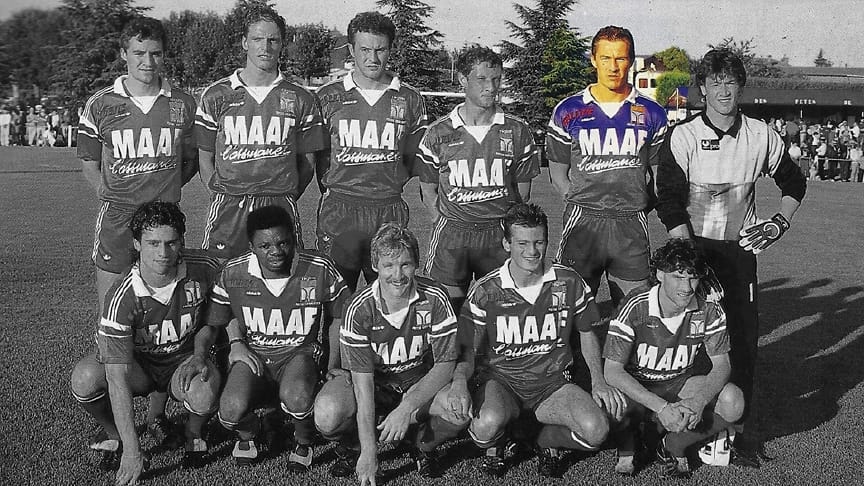Elements of Old Leeds: Oxford away, 1984
On and off the pitch, in Oxford and Leeds and beyond, the club had to spend another weekend defending its reputation.
Leeds United and Oxford United have only played thirteen competitive games against each other, so it's no wonder minds turn so easily to the famous 'flying Leeds fan' game of 1990. Not everyone enjoyed United's 4-2 victory as much as the Leeds supporter leaping and flying and somersaulting above and quickly below the mosh pit of celebration in the away end when Leeds were chasing promotion from 0-2 down at half-time. Lee Chapman was sheepish, and Howard Wilkinson was fuming, after captain Gordon Strachan let the striker miss a penalty that could have made it 5-2. "It is hard to turn down a big guy who is pleading, with tears in his eyes, for the chance to complete his hat-trick, and who just happens to be 6ft 3in tall," Strachan wrote in his newspaper column. A week later, at the club's AGM, an angry shareholder demanded that Chapman be fined a week's wages.
The next time the teams met was 1994, a joyless exhibit of Leeds United's misery in the FA Cup. 2-0 down again at the Manor Ground, Premier League Leeds fought back to 2-2 thanks to goals from David Wetherall and Gary Speed and forced a replay against the second tier relegatees in waiting. At Elland Road Leeds went 2-0 down yet again, to two quick goals on the hour, but Gordon Strachan in the 88th minute and David White in the 90th were United's heroes, forcing extra-time. Which was a waste of time, because three minutes into the second half Jim Magilton won the match for Oxford.
For a 2-0 Leeds United lead we can go back to the first league meeting between the teams, in November 1984. The first ever meeting had happened the previous November in the League Cup, a 1-1 draw at Elland Road meaning a replay on the Manor Ground's sloping pitch where Oxford ran up a 4-1 win. Media tycoon Robert Maxwell was behind Oxford's rise up the Football League and they won the Third Division title that season; John Aldridge was the fast-rising goalscorer Leeds had to stop when they met in Division Two. Leeds also, on several fronts, had to spend the weekend defending the reputation of the club, its greatest players, and its most famous team.
Oxford's rise was smooth enough on the pitch but fraught off it, as their owner was testing the limits of what the 1980s would mean for the future of football. As well as Oxford United, Robert Maxwell owned 19 per cent of Reading, and at the end of the 1982/83 season he had announced his intention to merge the two clubs. Thames Valley Royals would alternate their home games between the Manor Ground and Elm Park until a new stadium could be built. Amid opposition and protests from fans of both clubs Maxwell announced that, "Nothing short of the end of the Earth will prevent this from going through," while both sets of players worried for their careers; coming back from the match at Doncaster where they'd first heard about the plans, Oxford's players expressed 'a feeling of incredulity, confusion, worry and fear'. The Football League's chairman merely observed that Maxwell's plan was, "a bold and imaginative move which I'll be watching with interest."
The merger was halted that summer after former Reading player turned construction millionaire, Roger Smee, challenged the takeover in the courts then bought control of Reading FC himself. Maxwell, though, kept his 19 per cent of Reading, and hadn't tired of testing his concepts of multi-club ownerships and mergers. In 1987 he bought Derby County and attempted to buy Watford from Elton John; in 1988 he tried to buy French club Chamois Niortais to prevent them from selling Lee Chapman to Nottingham Forest rather than Derby. All this prompted the Football League to stop watching Maxwell's 'bold and imaginative' moves with interest and introduce rules to stop major shareholders in one club from owning more than 2 per cent of another. That, as we know from 49ers Enterprises' interest in Rangers and Red Bull's infiltration everywhere, was not the end of the idea.
Chapaeu: Lost in France with Lee Chapman
The full story of Chappy's time in France, Maxwell's attempts to buy him, and why 'Lee Chapman Niort' has been a regular search term of mine over the years.
Leeds United, meanwhile, were trying to find their own way of coping with the 1980s. Eddie Gray had stabilised the club since becoming manager after relegation in 1982, finishing 8th then 10th in Division Two as he built a new and very young team in the manner of his own mentor, Don Revie. John Sheridan, Scott Sellars, Denis Irwin and Andy Linighan didn't look like new Madeleys, Hunters or Reaneys, but had enough about them to remind older fans of how those legends had also begun in the doldrums of Division Two. And they had legends to guide them. As well as Eddie Gray in the dugout, his thirty-year-old brother Frank was in the team, with Peter Lorimer (almost 38) and goalie David Harvey (just shy of 37) ensuring the word 'veteran' was never far away.
